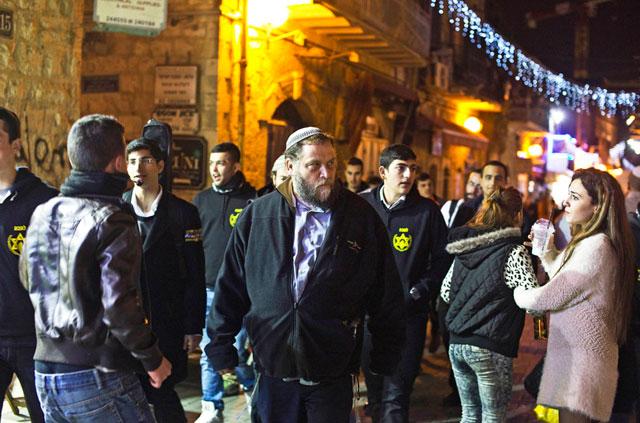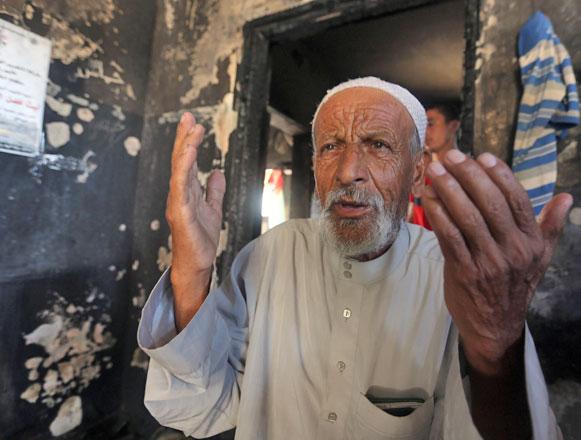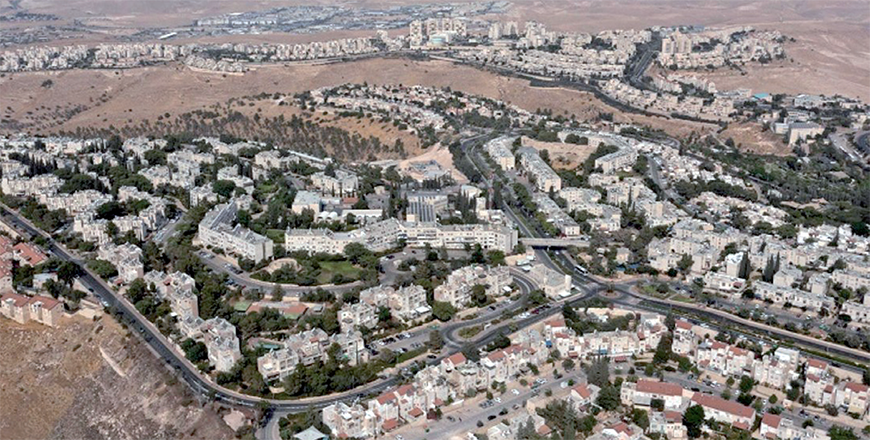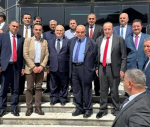You are here
Anti-Arab group poses legal, political dilemma for Israel
By Reuters - Dec 28,2014 - Last updated at Dec 28,2014

OCCUPIED JERUSALEM — A far-right Israeli group that agitates against Arabs in the name of religion and national security is forcing Israel into a legal and political balancing act as it tries to contain sectarian violence.
Among their activities, Lehava activists yelling "Death to the Arabs" picketed the wedding in August of a Muslim to a Jewish woman who converted to Islam. Now three members have been charged with an arson attack on a cross-faith school in Jerusalem last month.
Communal tension has been rising following last summer's Gaza war, in which more than 2,000 Palestinians died, and feuding over access to Jerusalem's holiest site. This has spilled over into Palestinian street attacks on Jews, including the killing of four rabbis and a Druze policeman at a synagogue.
Illustrating the risk of sectarian violence, a Palestinian youth was burned to death in July by Israeli assailants in alleged revenge for the killing of three Jewish settlers by fighters in the West Bank.
The authorities are under pressure to deal with anyone encouraging Jewish retaliation against Israeli Arabs and Palestinians. Efforts to tackle Lehava, however, may be complicated by guarantees of free speech and sympathy for the group among a minority of Israelis.
Lehava, whose name means "flame" but is also a Hebrew acronym for "Preventing Assimilation in the Holy Land", denies wrongdoing and says it is the target of a political witch-hunt.
Israeli forces rounded up 21 Lehava members, including its leader Benzion Gopshtein, after the attack on the school where Jewish and Arab children study together. The raids suggest a crackdown on Lehava, and maybe a ban, is in the works.
The three men charged with the arson attack have yet to enter a plea, while Gopshtein argues he is being targeted for what he says, not what he does.
"I'm being investigated for public comments I made about co-existence, even though I never advocated violence," he told Reuters after being released from police custody. Lehava's policy was to stay within the law, he said, but he declined to condemn the school attack.
Gopshtein, who put the number of Lehava members at 5,000, said the authorities "are bothered that we have such broad support, which is why they're carrying out arrests".
An Israeli official described the Lehava arrests as part of a drive to stamp out hate speech. Among those facing charges are eight Palestinians from East Jerusalem accused of encouraging attacks on Israelis over social media. But the official said securing convictions against Lehava activists on possible charges of inciting racist attacks would be harder.
“Their public statements have been less unequivocal,” said the official, who spoke on condition of anonymity. “It is a complex matter, especially as we do not want to intrude on legal rights to freedom of expression.”
Incitement to violence on racial or religious grounds carries a 5-year prison sentence in Israel, 20 per cent of whose citizens are Arabs. When felonies are committed as a result of such incitement, hate-crime legislation empowers judges to double the standard penalties.
Hard core views
Lehava’s core cause is discouraging romances between Jews and gentiles, saying it is campaigning to preserve Judaism.
While such relationships are rare in Israel, the group has disseminated names and pictures of Arabs suspected of courting Jewish women, and critics accuse it of using vigilantes to threaten the men with violence.
Lehava has also urged Israeli businesses not to employ Palestinians from the occupied West Bank and East Jerusalem, branding them as “tomorrow’s terrorists”.
Gopshtein was a disciple of the late Meir Kahane, a US-born rabbi who advocated the expulsion of Arabs from Israel and the Palestinian territories. Gopshtein, 45, said he had previously had run-ins with the police for disorderly conduct while active with Kahane’s movement Kach, which was banned from Israeli politics as racist in 1988.
Asked whether Lehava might similarly be outlawed, the Israeli official said: “That possibility will be examined.”
Mainstream Israeli leaders have condemned the arson attack and other racist incidents. The arrests were led by a police taskforce set up last year to tackle violent far-right Jews.
Tamar Hermann, a sociologist and pollster with the Israel Democracy Institute (IDI), said state action against Lehava had only followed repeated complaints by left-leaning petitions and media commentators.
Such pressure on police, Herman added, may be offset by the growing ranks of Israelis who sympathise with Lehava. An IDI poll to be published next month found 21 per cent of Israeli Jews identify themselves as “religious nationalists”, she said, while about 31 per cent hold “hard-core” views against gentiles.
“The rise of extreme religiosity that we are seeing in the Middle East, and even in Europe and the United States, is happening in Israel, too, and I don’t see it as merely a counter-reaction to Arab hostility,” Hermann said.
Menachem Landow, a retired official of the Shin Bet security agency, argued against banning Lehava, saying its ideology “would simply morph and find a new legal home”.
“The trouble-makers here are generally from a certain sector of Israeli society, dislocated young men from pious backgrounds, who simply hate Arabs as part of a race theory and are looking for a framework in which to act on that hatred,” he said.
“They have to be tackled individually,” Landow added, noting police had used these tactics against Israeli football fans whose anti-Arab taunts have at times escalated into race riots.
Related Articles
OCCUPIED JERUSALEM — Israeli forces questioned Tuesday a Jewish extremist leader who condoned torching churches amid an uproar over recent h
OCCUPIED JERUSALEM — Israel arrested several suspects Sunday in raids linked to the deadly firebombing of a Palestinian home and placed two
WASHINGTON — The United States on Thursday imposed new sanctions against Israeli extremists over violence against Palestinians, including fi
















